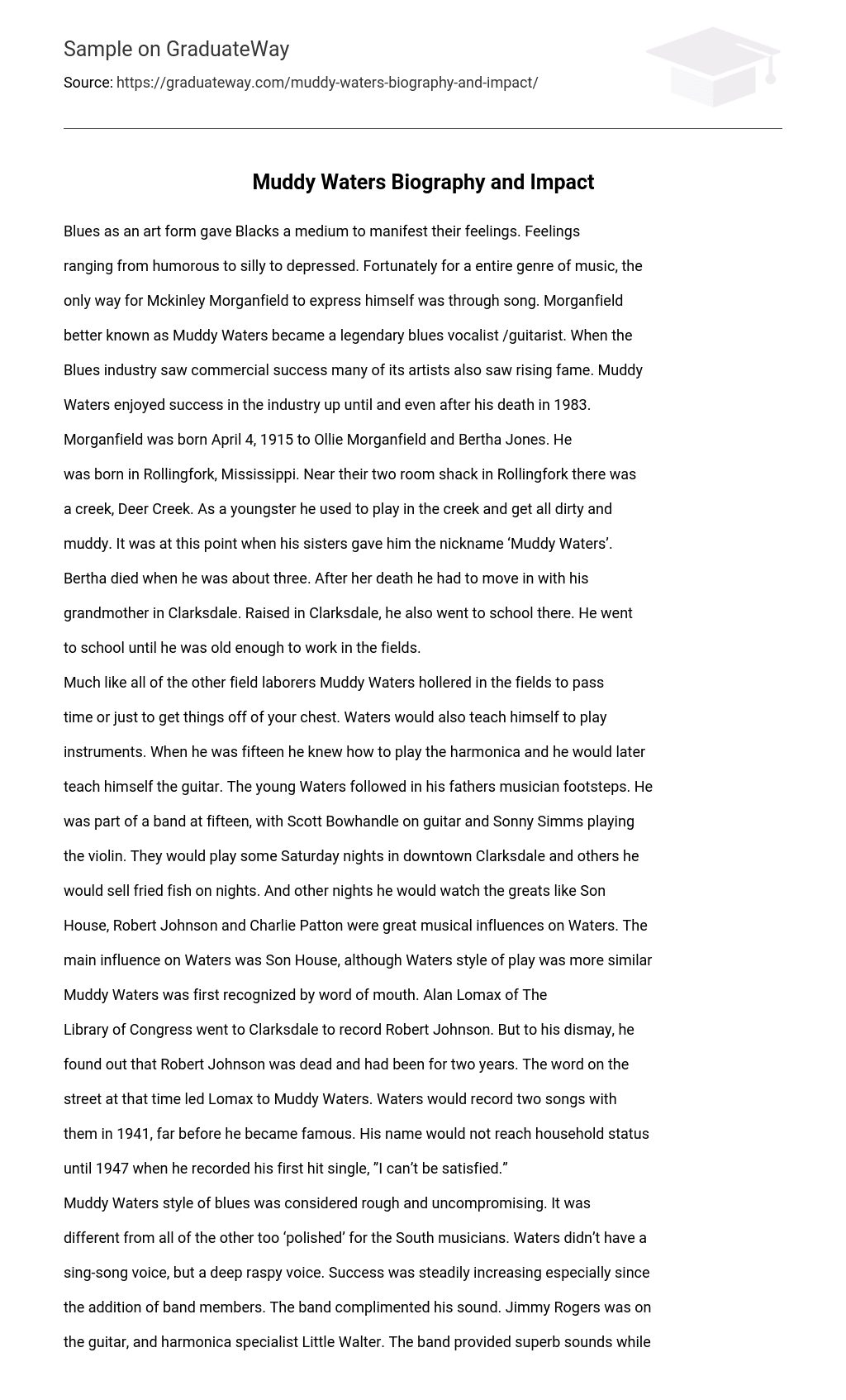Blues provided a platform for Black individuals to express their emotions, ranging from humor to silliness to despair. One individual who capitalized on this art form was Mckinley Morganfield, also known as Muddy Waters, a renowned blues vocalist and guitarist. As the blues industry gained commercial success, so did many of its artists, including Waters. Throughout his life and even after his death in 1983, he enjoyed recognition in the industry. Born on April 4, 1915, to Ollie Morganfield and Bertha Jones in Rollingfork, Mississippi, Waters grew up near Deer Creek, a creek where he would play as a child and get dirty, earning him his beloved nickname.
Bertha passed away when he was approximately three years old. Subsequently, he had to relocate to Clarksdale and live with his grandmother. During his upbringing in Clarksdale, he attended school until he reached an age where he could commence working in the fields. Like other field laborers, Muddy Waters resorted to hollering in the fields either as a pastime or to release pent-up emotions. In addition, Waters taught himself to play musical instruments. By the time he turned fifteen, he had mastered the harmonica and later went on to self-teach the guitar. Following in his father’s footsteps as a musician, Waters joined a band at the age of fifteen, alongside Scott Bowhandle on guitar and Sonny Simms playing the violin. On certain Saturday evenings, they would perform in downtown Clarksdale or alternatively, Waters would vend fried fish. Moreover, Waters sought inspiration from acclaimed musicians such as Son House, Robert Johnson, and Charlie Patton. However, Son House had the greatest impact on his musical style, although Muddy Waters gained recognition initially through word of mouth.
Alan Lomax, from The Library of Congress, visited Clarksdale to record Robert Johnson. However, he discovered that Johnson had already passed away two years earlier. At that time, word on the street directed Lomax to Muddy Waters. In 1941, Waters collaborated with Lomax to record two songs, even before he gained fame. It wasn’t until 1947 when he released his first hit single, “I can’t be satisfied,” that his name became well-known. Waters’ blues style was characterized as raw and unyielding, setting him apart from the overly polished musicians of the South. His voice was deep and gravelly, not melodic like others. With the addition of band members, success soared. The band’s musical contributions enhanced Waters’ sound; Jimmy Rogers played guitar, and Little Walter was a harmonica expert. In my opinion, among the various selections I listened to, two stood out in my mind: “The Hoochie Coochie Man” and “Corine Corina.”
Waters declares his arrival and asserts himself as the hoochie coochie man, making sure the world knows he is here. With a consistent baseline, he starts each verse in a soft whisper and ends with a almost shouting, emphasizing his presence. The following song, ‘Corine Corina’, is lively and fast-paced. In a pleading tone, he questions why Corina doesn’t love him. By the end of the song, he separates from Corina. The record showcases a combination of saxophones, a bass, and a harmonica in its bridge. Neither of these songs conform to the typical expectations of a Blues song. “The most astounding aspect of the blues is that, despite conveying defeat and melancholy, they are not inherently negative. The weight of sorrow and sadness is transcended through intense sensuality, becoming an almost triumphant celebration of life, love, sex, movement, and hope.”
No matter how repressive the American environment, the Negro never lost faith or doubted their deeply endemic capacity to live. The blues, defined by Richard Wright as a lusty, lyrical realism charged with taut sensibility, embody this sentiment. Muddy Waters, a legend in both the Blues and music in general, served as an inspiration for artists ranging from blues to rock & roll. He took a single genre of music and transformed it into what we hear today, infusing his Delta roots style with the blues sound of Chicago. Through his influential sounds, Muddy Waters continues to be remembered even after his passing on April 30, 1983. His music lives on and continues to inspire others.





